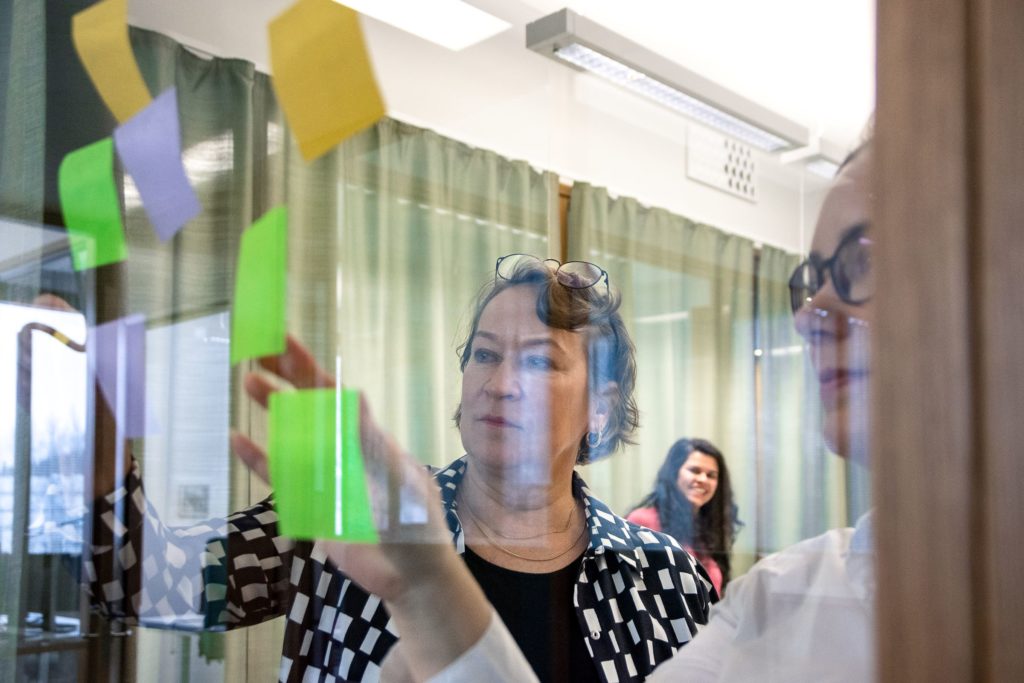Educational sciences PhD programmes in Finland
1. Is there a central database where I can find information and apply?
While Studyinfo.fi and Study in Finland provide links to doctoral studies in general, there is no central database specific to educational sciences. This post therefore gives an overview, which you can expand by visiting the individual university pages. Kindly note that this post is not being updated. Therefore, please refer to individual university websites and to studyinfo.fi for the most up-to-date information.
2. What PhD Education programmes are available in Finland?
Below the PhD programmes are listed alphabetically according to the names of the universities providing the programmes
Tampere University: Doctoral Programme of Education and Society . The research groups in the faculty explore educational phenomena from multiple perspectives, and aspects of sociology, philosophy, psychology, technology, learning sciences and arts are all represented. Research areas: Education in society; Communities in education; Learning, pedagogy and learning cultures
University of Eastern Finland: Doctoral Programme in Educational Studies. Research areas/disciplines: Adult education, special education, educational science, home economics, craft science and early childhood education
University of Helsinki: The university has two doctoral programmes in education.
- Doctoral Programme in Cognition, Learning, Instruction and Communication. Research areas/ disciplines: Learning and instruction, university pedagogy, work research, developmental psychology, personality psychology and cognitive brain research
- Doctoral Programme in School, Education, Society, and Culture. Research areas/disciplines: Various research fields of the educational sciences, for example, education from early education to adult education and work research, home economics, craft studies, special education, multicultural education, and subject education
University of Jyväskylä: Doctoral programmes in education, psychology and cognitive neuroscience. Specialisations are available in the doctoral programme in education: education, adult education, special education, or early childhood education
University of Lapland: Doctoral programme in education has two key themes: First, Learning and Teaching as Keys to Socially Sustainable Development; and second Education, Work and Equality in Arctic Communities. Research areas for first theme: Media pedagogy; Sámi pedagogy; Inclusive pedagogy; Teacher research; Feminist pedagogy. Research areas for second theme: well-being of children and the youth; well-being and participation in the media society; states, opportunities and limitations of agency in working life and training.
University of Oulu: Doctoral programme in Educational Sciences and Psychology
Research areas/Disciplines: Special Education, Educational Psychology, Educational Sciences, Music Education, Psychology, Sociology and Gender Studies
University of Turku: The university has three programmes relevant to doctoral studies in education.
- Doctoral Programme on Educational Policy, Lifelong Learning and Comparative Education Research. Research areas: comparative and international studies of education and education policy; equity and equality in education; educational exclusion and educational transitions of young and young adults; studies of higher education and university institutions; studies of lifelong learning and working life; and studies of special education and inclusiveness in schools.
- Doctoral Programme on Learning, Teaching and Learning Environments Research. Research areas: learning; learning environments; teaching; and teacher education.
- Doctoral Programme of Social and Behavioural Sciences. Research areas: Amongst other themes, relevant themes may be cognition and various states of consciousness; neural basis of various cognitive processes; and reading and reading comprehension.
Åbo Akademi University: Doctoral programme in Education. Research areas/Disciplines: Education (General); Education (Teacher Oriented); Early Childhood Education, Special Education, Adult Education, Home Economics, and Sloyd Science
3. What is the name of the degree resulting from these doctoral programmes?
The name of the degree granted at the end of the programme varies according to university and extent of studies. Fully completed doctoral studies in educational sciences result in the degree of Doctor of Philosophy or Doctor of Philosophy (Education), while doctoral studies completed to a lower level can result in the degree of Licentiate of Education (Lic Ed).
Admissions to PhD programmes in education
1. What is the application period for admissions into a PhD Education programme?
The admission period varies across universities. In most cases, there are two intakes in a year – autumn and spring. Details on the application period are given on respective university websites.
2. What are the requirements for making an application to a PhD Education programme?
i. Principal supervisor. Applicants are responsible for finding and contacting an appropriate supervisor for their research. The applicant and the supervisors must also agree on the supervision arrangements. The same agreements must be documented in the supervision plan. The template for the supervision plan is available on respective university websites.
A doctoral student needs at least two supervisors who must have completed their doctoral degree. Also, at least one of the supervisors must be in permanent or long-term employment at the university faculty awarding the doctoral degree on completion of PhD studies. The second or third supervisor can be from any other university.
ii. Research plan. The structure varies across the doctoral programmes. In most cases, the plan requires the applicant to write: Background/introduction; Research questions; Research methods; Expected results; Ethical issues in research; Stages and schedule of research; Funding plan; Research team and supervision; and References. The research plan is evaluated based on aspects such as feasibility of the plan, scientific significance, suitability to the profile of the doctoral programme, and ethical issues.
For more details on the research plan, refer to respective programme websites.
iii. Previous degree. A master’s degree, or an equivalent degree giving eligibility for doctoral studies. The degree must be relevant to the desired field of doctoral research. Otherwise, the applicant may be required to undertake bridging studies considered necessary for doctoral research. In the previous degree, in some cases, it is mandatory to have at least 60 ECTS credits in an educational subject or any other equivalent studies relevant to the subject of education.
iv. Grade requirement. Previous studies must be completed with at least 60% of the maximum grade, or 3/5, in both taught studies and the master’s thesis. There might be exceptions in grade requirements; they can be looked up on university websites. To demonstrate previous studies, applicants are required to attach transcript of records and degree certificates to the application.
v. Language skills. The applicant must possess sufficient language skills in English and/or Finnish. To demonstrate their language skills, applicants are required to share either of the following: TOEFL, IELTS, Pearson Test for English.
If the applicant has completed Bachelor’s, master’s or doctoral degree completed in English in a university or university of applied sciences in an EU/EEA country, Australia, Canada, United Kingdom, Ireland, New Zealand, the United States (excluding online degrees and offshore campuses), then a copy of the transcript of records must be uploaded. Please note that individual universities may have different lists of eligible countries. For example, in September 2023 University of Helsinki expanded the list with 37 additional countries.
vi. Individual Study Plan (ISP). ISP specifies the rights and obligations of the doctoral student and supervisors. The plan must be signed by the applicant and potential supervisors, and then submitted along with the application.
vii. Possible additional documents. Applicants may also be required to submit a CV, motivation letter, and a copy of a valid passport. If you have a Finnish personal identity code, you do not need to attach a copy of your passport.
3. Where do I submit my application?
The application has to be submitted on a portal called StudyInfo. Studyinfo.fi is Finland’s official national admissions portal which has up-to-date information about study programmes leading to a degree in the country.
4. How can I find a supervisor in a university in Finland before my admission?
Before finding an appropriate supervisor, having a tentative research plan will help. Tampere University has listed a set of questions that can help you with the thinking process. You may access the questions from here – List of questions.
Structure of PhD programmes
1. What is the overall structure and duration of a PhD programme?
The programme consists of Research work (writing the dissertation and defending it in public) and Studies. The studies are towards the development of scientific expertise and discipline- and field-specific studies.
The dissertation can be article-based or a monograph. The extent of studies usually includes up to 240 ECTS and the planned duration is up to 4 years.
2. What coursework is required during PhD studies?
The coursework varies across universities. Refer to the respective universities’ websites for coursework.
Funding
1. Do I need to pay tuition fees to pursue PhD in Finland?
No, pursuing PhD in Finland does not require payment of tuition fees.
2. Are there paid positions for doctoral students at the universities?
Yes, there are paid positions for doctoral students but obtaining a paid position is usually very competitive. To apply for a paid position, a doctoral student must have a valid study right at the university with open vacancy. If the position is open at the time of application, then the applicant is encouraged to apply for the position AND submit the application for the PhD programme separately. Applicants and doctoral students may find vacancies on respective universities’ websites.
3. If I do not get a paid position, then how can I fund my PhD studies – data collection, conference visits, publications and living expenses?
As a doctoral student, one can apply for research grants which cover living expenses and costs towards conducting research. Two important central databases for identifying relevant funding options are – Research Professional and Research.fi. It is also quite common for international PhD students in Finnish universities to fund their studies with a scholarship or other grant from their home country.














